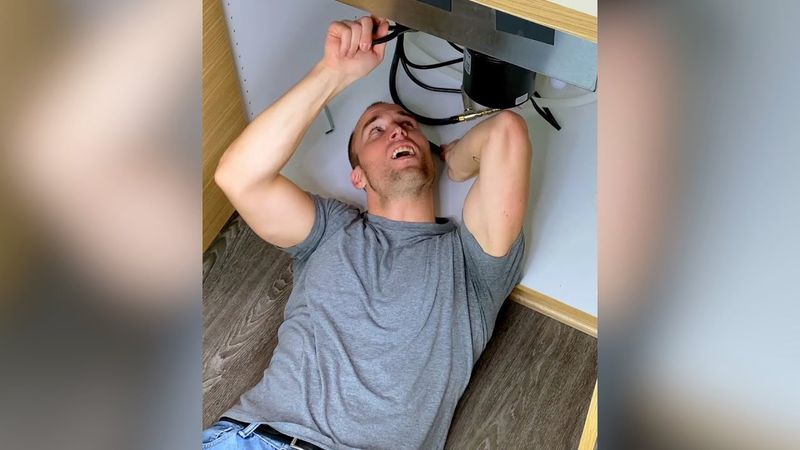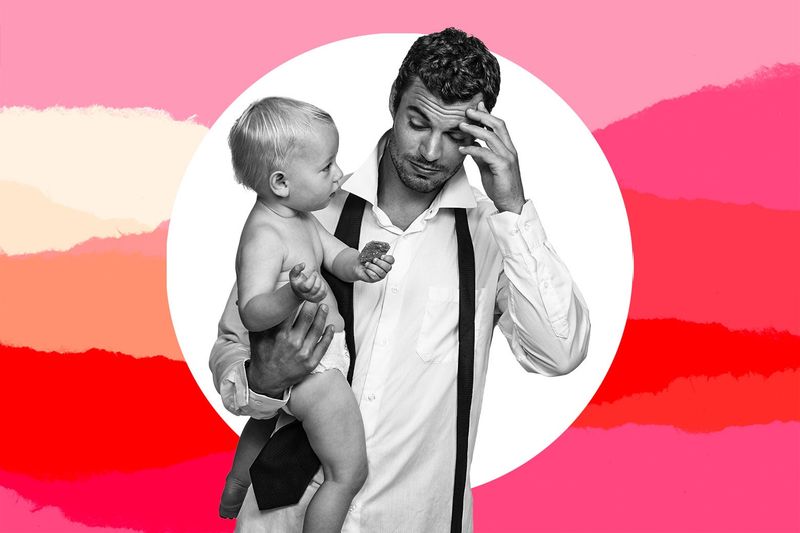We love men who show up, step up, and pull their weight in love and life. But somewhere along the relationship timeline, a laundry list of “manly” husband duties got carved into stone—and frankly? It’s outdated and, yes, downright insulting.
The modern man doesn’t want to be boxed into toxic roles any more than you do. So if you’re holding onto ideas about what a “real husband” should do, you might be pushing away the one who’s trying to be an equal—not a stereotype.
These aren’t just minor annoyances either—they’re the kind of stuff that chips away at connection and self-worth over time.
So let’s get really honest: it’s time to call out these so-called husband duties for what they are—a total buzzkill for real partnership. Scroll on for fifteen duties that today’s emotionally intelligent, evolved men are straight-up tired of being judged by.
1. “You’re the provider. Period.”
Nothing makes a man’s eyes glaze over faster than being reduced to a walking ATM machine. Growing up, we all heard the whispers: real men pay the bills, end of story. But modern men are looking for more than a never-ending cycle of hustle and handouts.
He wants to support the family, not be the only one bearing the weight. Sharing the load isn’t a threat to his masculinity, it’s an invitation to true partnership.
A man’s worth shouldn’t be measured by his paycheck or his ability to put steak on the table every Friday. The pressure to “provide” can make him feel both invisible and replaceable. A good marriage is built on teamwork, not outdated scorecards.
Fun fact: Dual-income households are now the norm, not the exception. Turns out, sharing the stress is a lot hotter than shouldering it alone.
2. “You fix everything—no questions asked.”
Tell me you haven’t handed your husband a screwdriver and a look that says, ‘You watched YouTube, right?’ Some men are natural tinkerers, but not all. Expecting every husband to be the family handyman? It’s exhausting, not empowering.
He might tackle leaks or squeaky doors out of love, but not every guy is secretly Bob Vila. Sometimes he’s learning on the fly, just like you are. There’s no shame in calling a pro.
The idea that he should fix anything from appliances to car engines just because he’s male is a recipe for resentment. Let’s retire the myth that masculinity equals mechanical genius. Wouldn’t you rather have a loving partner than a frustrated, under-qualified plumber?
Next time something breaks, maybe tackle it together—or at least offer to hold the flashlight. Partnership beats pressure every time.
3. “You never cry. You’re the rock.”
Raise your hand if you’ve heard, “Real men don’t cry.” That old chestnut is as tired as it is cruel. The “strong, silent type” stereotype pushes men into a corner nobody wants to be in.
Bottling up feelings isn’t healthy, no matter your gender. Men need space to fall apart just as much as anyone else. Vulnerability isn’t weakness—it’s courage in action.
Modern husbands crave relationships where letting down their guard is safe, not shameful. Pushing them to be stoic hurts everyone, especially when life gets heavy. Sometimes the bravest thing a man can do is shed a few tears.
Let’s be real: The world would be a softer place if men felt free to feel. Emotional honesty beats macho posturing every time.
4. “You’re in charge of discipline because ‘you’re the scary one.’”
Dad as the family enforcer? It’s a script that’s way past its expiration date. When discipline only lands on his shoulders, it sends the message that love and boundaries can’t live in the same house.
Some men hate being cast as the ‘bad cop’ just because of their deeper voice or bigger frame. Parenting takes teamwork, not a designated scarecrow.
Letting discipline fall entirely on him is unfair—and it usually backfires. Kids learn better when both parents share the responsibility, not when one becomes the household villain. A loving, united front changes everything.
Switching roles sometimes, or having tough talks together, teaches kids respect—without the fear. No one should be forced into the monster role just for tradition’s sake.
5. “You don’t need appreciation. That’s what you’re supposed to do.”
Here’s the tea: nobody’s immune to feeling invisible, especially when their efforts go unnoticed. Men are often taught that gratitude is optional for them, but mandatory for everyone else.
He may not say it, but a simple ‘thank you’ can mean the world. Appreciation isn’t about ego, it’s about being seen and respected by the person you love.
When we treat his contributions as background noise, we chip away at connection. Small acknowledgements have huge ripple effects in a relationship. Even the strongest husband wants to feel valued.
Why not let him know you notice? Validation is universal, not gendered. Trust me, your bond will thank you for it.
6. “You’ll take the hit on happiness if it means keeping the family afloat.”
Sacrificing your own joy isn’t some noble badge of honor—yet some men get sent to the front lines of family happiness by default. He’s expected to keep the ship afloat, even if his dreams sink.
Skipping out on hobbies, letting friendships fade, and pushing emotions aside is a recipe for quiet misery. No one wins if he’s just surviving for the sake of everyone else.
Real partnership means encouraging each other’s growth, not demanding silent martyrdom. Men deserve room to chase their own happiness, too. Supporting his well-being is supporting the family as a whole.
Let’s ditch the expectation that he should always come last. Balance beats burnout any day.
7. “You’re not allowed to say ‘I’m tired.’”
Ever notice how ‘I’m tired’ sounds different coming from a man? He might as well be saying he’s lazy or can’t handle life. The truth is, exhaustion doesn’t care about gender.
Modern men juggle work, parenthood, partnership, and their own expectations—just like women. Yet somehow, his fatigue gets brushed off as whining or weakness.
When we minimize his stress, it chips away at empathy. Everyone has a breaking point, even the husband who ‘never complains.’ Letting him voice his needs doesn’t make him less capable—just more human.
So next time he says he’s wiped out, maybe hand him the remote and skip the sarcasm. Compassion goes a long way.
8. “You should know how to grill, fix a tire, and install a ceiling fan or you’re not a man.”
Masculinity isn’t measured by DIY skills, yet somehow the “man card” gets revoked for not knowing how to grill or fix a tire. The pressure is real, and it’s more annoying than empowering.
Some men are wizards with tools, others are geniuses in the kitchen—or neither! Expecting all husbands to check every box on the handyman checklist is setting everyone up for disappointment.
Wouldn’t it be better to celebrate strengths, instead of shaming gaps? The best husband might make a mean breakfast but have zero clue how to change oil—it doesn’t matter. Love isn’t about conforming to stereotypes from decades past.
Let’s let men be themselves, not the sum of their toolkits.
9. “You always drive. Period.”
Why are husbands automatically cast as family chauffeurs? For some, driving’s a treat; for others, it’s just another chore tacked onto the “man job” list. Sometimes, he’d rather just play DJ.
Letting him ride shotgun every now and then isn’t just refreshing—it’s respectful. Sharing the wheel reflects a true partnership, not a tired script from the fifties.
If he wants a break from white-knuckling the steering wheel on road trips, hand over the keys and enjoy the change. Turns out, backseat driving isn’t exclusive to moms. Everyone deserves a shot at the aux cord—and the view.
10. “You’re in charge of protecting us at all times.”
Hearts race when things go bump in the night, but does that mean your husband signed up to be a 24/7 bodyguard? Expecting him to be on high alert at all hours is draining on every level.
Protection is a partnership—everyone deserves to feel safe, but no one wants to feel solely responsible for everyone’s security. Being treated like a security system instead of a person wears thin fast.
Every family needs safety, but husbands aren’t superheroes—or bulletproof. True security comes from trust, communication, and having each other’s backs, not just bracing for the next crisis.
Let him be a partner, not a fortress.
11. “You don’t need close friends. I should be enough.”
Friendships aren’t optional—no matter your relationship status. When men are told their partner should be their entire world, it’s a fast track to loneliness.
Male friendships are rare, precious, and vital for mental well-being. A solid crew can help him process stress, share laughs, and grow in ways romantic love can’t.
Supporting his friendships is a gift to both of you. When he returns from a night out with a lighter heart, you benefit too. Rather than competing for his attention, know that outside friendships fuel the man you love.
Marriage is richer when both partners have room for connection beyond the home.
12. “You’re the one who always sacrifices for the job move, the family, the ‘big picture.”
Men are expected to put their needs last—then be called selfish when they finally speak up. Society conditions men to be the perpetual givers – swallowing career compromises, family relocations, and personal dreams for “the greater good.”
They’re praised for silent endurance but shamed as “selfish” when they finally express needs. This creates toxic resentment that erodes relationships over time. True partnership requires reciprocity – not one-sided martyrdom.
When both spouses take turns compromising, they create space for mutual growth.
Healthy marriages acknowledge that both individuals deserve to feel valued, not just as providers or caregivers, but as human beings with evolving needs.
13. “You should be obsessed with physical intimacy, 24/7.”
Modern masculinity is trapped in an impossible paradox: men are expected to always be physically available yet emotionally present, perpetually desiring intimacy yet never overwhelmed.
This performance-based model of connection reduces relationships to transactions rather than authentic bonds.
True intimacy flourishes in the space between bodies AND minds – through shared vulnerability, honest conversations about needs, and the freedom to say “not now” without judgment.
When partners move beyond assumptions and create room for fluctuating desires, they build a connection that adapts to life’s seasons rather than crumbling under unrealistic expectations.
14. “You don’t get to say ‘this isn’t working for me’ unless it’s financial.”
Many men discover their feelings only matter when framed as financial concerns. Expressing loneliness, emotional neglect, or relational dissatisfaction often triggers defensive reactions: “At least you’re providing” or “Other husbands have it worse.”
This transactional mindset reduces men to their utility while starving their humanity.
A husband’s worth shouldn’t be measured in paychecks or chores completed. Healthy marriages recognize that emotional fulfillment isn’t a luxury – it’s the foundation that makes all the giving sustainable.
When men feel seen as complex individuals rather than providers, relationships transform from obligations into chosen connections.
15. “You’re lucky just to have a family. Stop complaining.”
It becomes a silencing weapon against male vulnerability, implying that love means suffering without complaint.
This false dichotomy forces men to choose between appreciation and authenticity, when in truth, gratitude grows deepest in soil rich with honesty. Burnout, grief, and frustration don’t negate love – they’re human experiences that, when shared, create opportunities for deeper connection.
Families thrive not through suppressed emotions, but through the courage to say “I’m struggling” and receive support without judgment.
The healthiest homes make space for both thankfulness and truth.
















